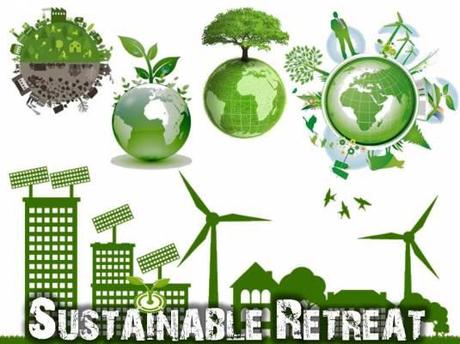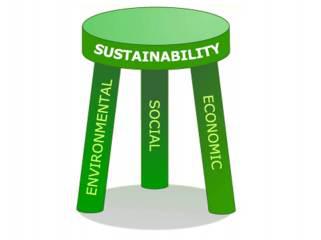
Global warming is “the response of our outraged planet”.
The planet is trying to restore its equilibrium and all the protocols, summits, and concepts developed so far are simply a vain attempt to control this Earth self-regulating system.
An abrupt and climatic shift is unavoidable.
Sustainable development is a contradiction and its time has been passed already. We have come to a time where development is no longer sustainable and therefore we need to retreat.
Man’s idea of progress has become an obsession, a sort of drug, which “may kill if continued and kill if suddenly withdrawn”
With the multitude of natural disasters we have seen thus far, one has to question if our planet trying to tell us something.
I would suggest you think about how sustainable your actions are, or the actions of the organization you work for. Try to answer the following questions below:
- Does your business use accredited renewable energy?
- Do you recycle effectively or just say you do?
- Could you switch to environmentally friendly office products such as eco-friendly cleaning products, recycled paper and fair trade foodstuffs?
- Could you save some money by using energy efficient lighting and white goods?
- In the manner you print your documents, are you printing double sided? Using scrap paper for notepaper?
- Does your organisation give back to the local community by actively supporting a local charity?
Change starts with a single person, and that must be you.
But is it really too late for?
Understanding Sustainable Development
The concept of sustainability centers on a balance of our society, economy and environment for current and future health. Sustainability is the intersection of people (social), planet (environmental) and profit (economic), commonly referred to as the “three-legged stool.”

The concept of sustainable development was born around the ‘60s and ‘70s and many claim it is still evolving. In fact, in almost half a century many definitions have been provided and a shared explanation has not been reached yet.
“Sustainable development is development that meets the needs of the present without compromising the ability of future generations to meet their own needs.” Our Common Future: the Report of the World Commission on Environment and Development (also known as the Brundtland Report, Brundtland Commission of 1987)
“Sustainable development, sustainable growth, and sustainable use have been used interchangeably, as if their meanings were the same. They are not. Sustainable growth is a contradiction in terms: nothing physical can grow indefinitely. Sustainable use, is only applicable to renewable resources. Sustainable development is used in this strategy to mean: improving the quality of human life whilst living within the carrying capacity of the ecosystems.” IUCN, UNEP, WWF (1991)
“Sustainable development is development that delivers basic environmental, social and economic services to all residents of a community without threatening the viability of the natural, built, and social systems upon which the delivery of these services depends.” ICLEI (1994)
“Sustainability is a concept, a goal, and a strategy. The concept speaks to the reconciliation of social justice, ecological integrity and the well being of all living systems on the planet. The goal is to create an ecologically and socially just world within the means of nature without compromising future generations. Sustainability also refers to the process or strategy of moving towards a sustainable future.” (Moore 2005, 327)
“Sustainable development involves the simultaneous pursuit of economic prosperity, environmental quality and social equity. Companies aiming for sustainability need to perform not against a single, financial bottom line but against the triple bottom line.” (The Sustainability Report, n.d.)
“Sustainability may be described as our responsibility to proceed in a way that will sustain life that will allow our children, grandchildren and great-grandchildren to live comfortably in a friendly, clean, and healthy world (it assumes) that people:
- Take responsibility for life in all its forms as well as respect human work and aspirations;
- Respect individual rights and community responsibilities;
- Recognize social, environmental, economic, and political systems to be inter-dependent;
- Weigh costs and benefits of decisions fully, including long-term costs and benefits to future generations;
- Acknowledge that resources are finite and that there are limits to growth;
- Assume control of their destinies;
- Recognize that our ability to see the needs of the future is limited, and any attempt to define sustainability should remain as open and flexible as possible” (Sustainable Measures, n.d.)
and many others….
This lack of a precise definition should not be considered as totally negative because it has allowed a considerable consensus to evolve in support of the idea that “it is both morally and economically wrong to treat the world as a business in liquidation”.
Whatever its meaning, such an idea is too good to not be shared between common people. For this (and many, more academic, other reasons), many scholars and scientists consider sustainable development a pipe dream.
James Lovelock, a British independent scientist, environmentalist and futurologist who originated the Gaia hypothesis, offers the concept of “sustainable retreat”.
Lovelock defines the necessary changes that the world population must bring at the global scale with the purpose of adapting to global warming and preventing its expected negative consequences on humans.
Retreat, in his view, means that ”it’s time to start talking about changing where we live and how we get our food; about making plans for the migration of millions of people from low-lying regions; among other urgent moves and changes. Most of all, he says it’s about everybody “absolutely doing their utmost to sustain civilization, so that it doesn’t degenerate into Dark Ages, with warlords running things, which is a real danger. We could lose everything that way.”
The fundamentals of sustainable retreat
At the base of sustainable retreat there is technology. Let’s get this clear, high technology! Lovelock states that “the environmental crisis can’t be overcome by low-tech solutions such as organic farming and the current forms of renewable energy”. A higher level of technology may be fundamental to reduce humanity’s impact on the planet and at the same time to prevent us from being severely affected by climate change impacts. This urgent need of technological aids is due to the fact that we don’t have time anymore. He proposes extreme solutions, many of which are difficult to be accepted by ordinary people and may not be the ultimate solution, but they provide important food for thought on which we should work.
Lovelock puts the fact that we are too many as the primary cause of all environmental problems. We have exceeded the limits and any species that does that has a crash. We are now perceived by the planet as a disease which is trying to disable its functions. To overcome this situation we should transform our actual society into an “ultra-high-tech low-energy civilization”. Lovelock states that this may be possible but to do that we have to set apart our current idea that things such as renewable energies, hybrid cars, organic farming are the ideal solutions.
Technologies for a sustainable retreat
To satisfy the needs of all 7 billions of us, Lovelock suggests using cutting-edge technologies. For water there will be the need of desalination plants, which can turn ocean water into drinking water. We will also need technology to enlarge and produce new sources of food. We could synthesize all the food needed (e.g. lab-grown meat). We will move to northern areas of the Earth, and we will cluster in smarter and more organized cities where there will be no space for backyard gardens. Also our supply of electricity should be different, with nuclear power acting as main source.
Yes, Lovelock has always been in favor of using nuclear energy, so much to say that “nuclear power is the only green solution”.
Spiraling costs, safety concerns and opposition from environmentalists have kept many from building any new nuclear power plants. But Lovelock argues that nuclear power is the only source of energy which can significantly lower the use of fossil fuels nowadays, which in the long run is more expensive to use as compared to nuclear power.
Technologies such as wind turbines and solar panels have an efficiency which is too low to solve the problem at a global level.
Moreover he claims that “environmentalists are right about the dangers but it is still nothing compared to the dangers of climate change”.
Lovelock has also thought of technologies to be used in a “last resort” scenario. With the technology developed by an astronomer named Roger Angel, humans may be able to manipulate the Earth’s climate by deploying a space sunshade constituted by trillions of free-flying spacecraft a million miles above Earth which will form a long, cylindrical cloud able to uniformly reduce sunlight by about 2 percent over the entire planet, enough to balance the heating of a doubling of atmospheric carbon dioxide in Earth’s atmosphere.

